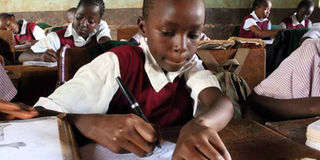Marsabit County seeks to promote girls' education

Standard Eight pupils at Gathukimundu Primary School in Mukurwe-ini write notes during class on May 3, 2016. Marsabit county plans to strengthen education by establishing boarding primary schools. PHOTO | JOSEPH KANYI | NATION MEDIA GROUP
What you need to know:
- Mr Yattani noted that girls above age 10 were being made to herd livestock and others were married off, fuelling their apathy towards education.
The Marsabit County government has initiated projects aimed at creating a favourable environment for female learners.
The plan is also meant to enable girls from the arid and semi-arid areas to compete fairly with the rest of the country.
While commissioning classrooms and a dormitory at Kanisa Nomadic Girls’ Primary in Moyale on Sunday, Governor Ukur Yattani said girls were dropping out of school due to unfriendly conditions.
He said his administration would strengthen education by establishing boarding primary schools.
In a programme officially called Building climate resilient schools in Marsabit County, the government will support 14 communities to improve learning among girls.
In the county, more boys enrol in schools than girls.
“It has always been my dream to build boarding schools in the region to advance girls' education. We want to change the region and fight retrogressive cultural practices,” he said.
Mr Yattani noted that girls above age 10 were being made to herd livestock and others were married off, fuelling their apathy towards education.
“The cultural practice is unacceptable. Unlike boys, the girls lack motivation to pursue education simply because they do not get enough time to concentrate in class,” said Mr Yattani.
The sector has also received a boost following the establishment of the Kanacho Nomadic Education Foundation (Knef) in partnership with UKaid, a non-profitable organisation that assists communities to educate female children.
Knef CEO Hussein Harubu said educating more girls would bolster efforts to tackle societal issues such as health.
By Philip Momanyi





